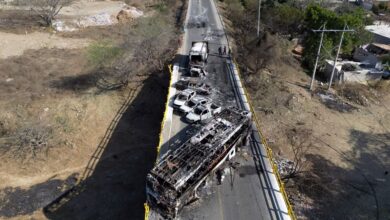In a county where government statistics say that 20 per cent of citizens live below the poverty line, 28.6 per cent are illiterate rate, 40 per cent go through a divorce, it is rare when people revolt against the conditions of their lives. It is even rarer to see the divide between the state and the people crossed.
But are the expressions of anger over the past week a sign that anything is changing? A sampling of reactions from people on the street shows that the so-called national resistance may, in fact, be more complex than many would expect.
Some people are more angry with the Egyptian officials in charge of the game’s affairs than they are with the Algerians. They think that they have not fulfilled their role in preparing for the match. “We haven’t done our homework,” said Tarek Hassan, 43, a journalist.
Many are also questioning the absent role of the Egyptian ambassador in Algeria, the ambassador in Sudan, and the Egyptian intelligence services in both countries.
“Of course, our Egyptian ambassador in Algeria must have known that the Algerians sent 18 flights of fans to Sudan,” said Mohsen Zaki, 37, an engineer.
Mostafa Said, a 30-year-old a web designer agrees. “Why haven’t they given us a clue?” he said.
Others point out reports that there were around 10,000 Algerians on the Sudanese streets three days before the match and yet the Egyptian ambassador to the Sudan failed to inform us here. “Many scenarios would have changed if we only knew the actual situation before the match date,” said Hassan. One popular scenario adapted almost across the board is that we should have sent hardcore hooligans to represent Egyptian fans instead of actors and members of the media.
But the problem may not have been who traveled and who stayed. “Our problem is that we were made to feel that we had already won and we were on our way Algeria to pick up our tickets to the World Cup,” said security guard Mohamed Alattar, 53.
“The moment we thought we guaranteed victory is the same moment we were defeated,” said Tarek Fahmy, 44, a taxi driver.
Most people who spoke to Al-Masry Al-Youm agreed that they would not take such harsh action in another context or for another reason.
Some explain this discrepancy by saying there is an absence of a leader/role model for Egyptians, someone who would organize people and call them to action. “Instead we have the TV and the media could have organized other campaigns, such as one to clean the streets Cairo from garbage,” said Mohab Kamel, a 24-year-old TV consutant.
Kamal Saleh, 40, a pharmacist, suggested that the Egyptians need a national project to work on, such as the reform of the education system. Otherwise, a void is left that can be filled with anything–even football.
Others voiced the opinion that we do not work to solve our more obvious problems because we believe that we have no role to play in solving our countries them. “What are we going to do? Nothing. The officials are the ones in charge,” said Marwa Khattab, 23, an executive secretary.
Another taxi driver, Mohamed Abbas, 45, said that the leaders of the state couldn’t do anything to protect the Egyptian fans, because "they know that they are hated, and that is because they sold the gas to Israel and they normalized with Israel and privatized the whole country. We Egyptians are now hated by all Arabs."
Others announce that Egyptians are not used to demanding their rights as citizens and can only express their frustrations over minor matters. “We are a small minded society,” opined Amal Waheed, a 23-year-old lawyer.
Or maybe deep down we just fear the government.
“If one goes out to express anger against our living conditions, his neighbor would hold him back saying don’t go, you have kids,” said Ahmed Mahmoud, 41, who owns a mobile shop.
Football has been a safe playing field and offered a rare opportunity for people to identify with each other under an non-threatening banner.
“We faced happiness and sadness together as Egyptians. I wish we could think like that all of the time and forget about our sectarian differences,” said Amir Tadros, 43, an accountant.
Kamel Mohammed, a 50-year-old pharmacist thinks that "all of this TV propaganda is because the announcers and actors were not treated like celebreities in Sudan, so they are in a personal revenge status and they are dragging the masses behind them."
At least some people are taken aback by the war-like nature of popular discourse. “I wonder why people are holding up so many flags, why radio channels keep on airing just national songs? Are we at war?” Tadros asked.




